English Legal System: Barristers, Solicitors, Duties, and Regulations
VerifiedAdded on 2023/01/10
|8
|1901
|59
Report
AI Summary
This report provides a comprehensive analysis of the roles, responsibilities, and regulatory frameworks governing barristers and solicitors within the English legal system. It begins by differentiating between the duties of barristers, who primarily function as advocates in high courts, and solicitors, who handle office work, client advice, and paperwork. The report then examines the regulatory bodies overseeing each profession, highlighting the role of the Bar Standards Board (BSB) and the Inns of Court in regulating barristers, and the implications of the disciplinary processes. The report also considers the roles of the COIC and the need for fairness and transparency in the regulatory mechanisms, including the potential for involvement from high court judges. Finally, the report concludes by summarizing the key differences and similarities between the two legal professions, emphasizing their distinct roles and regulatory oversight within the English legal system.
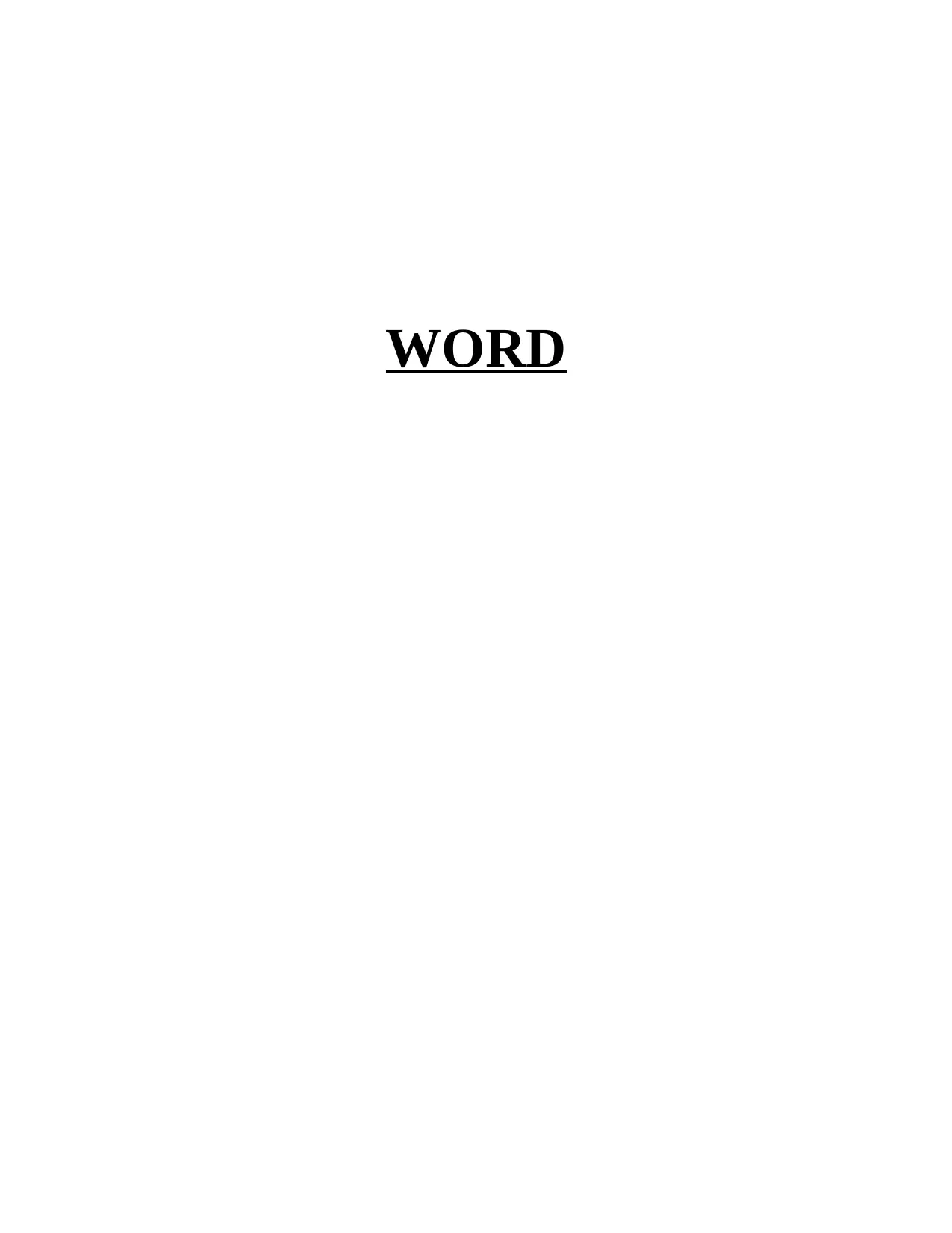
WORD
Paraphrase This Document
Need a fresh take? Get an instant paraphrase of this document with our AI Paraphraser
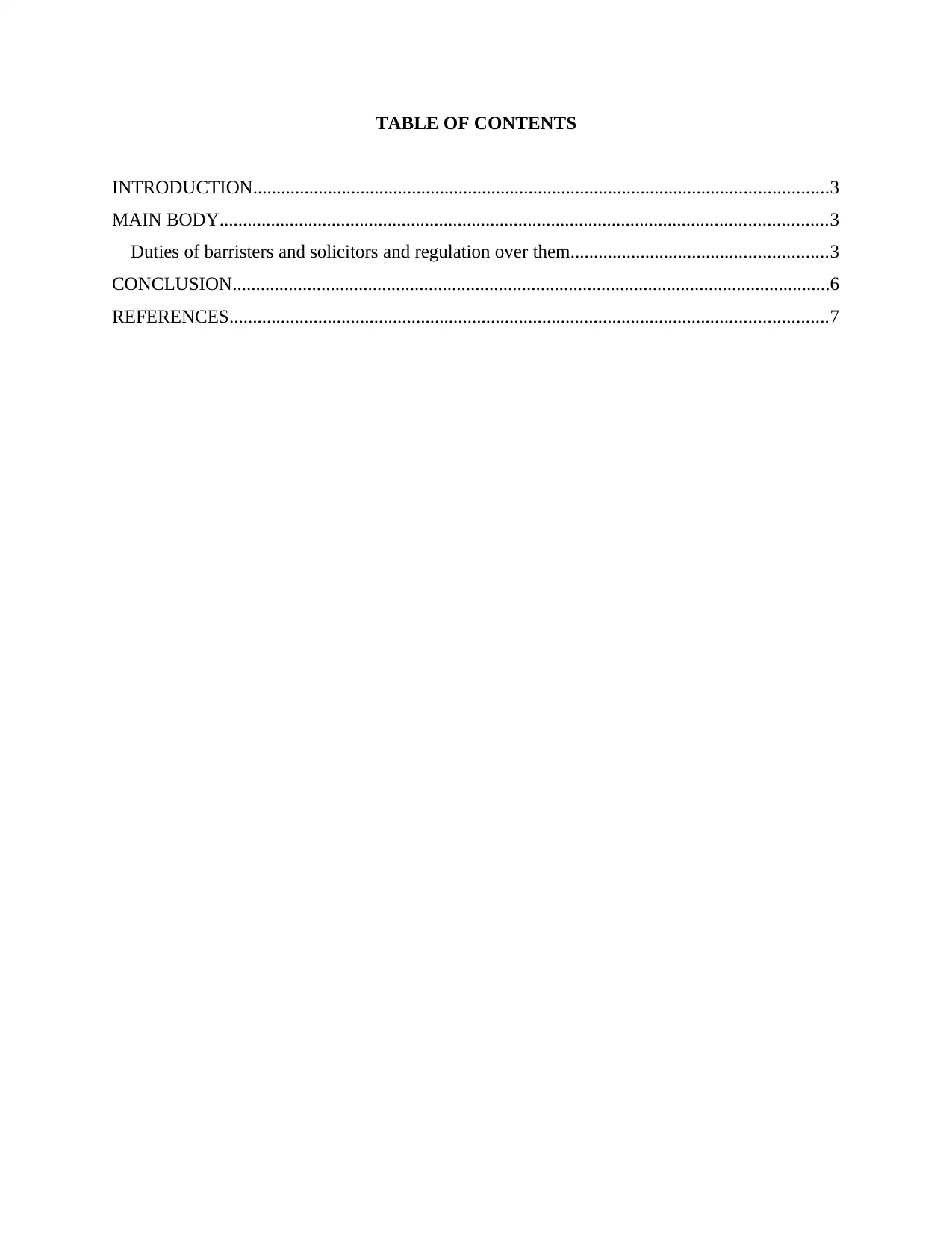
TABLE OF CONTENTS
INTRODUCTION...........................................................................................................................3
MAIN BODY..................................................................................................................................3
Duties of barristers and solicitors and regulation over them.......................................................3
CONCLUSION................................................................................................................................6
REFERENCES................................................................................................................................7
INTRODUCTION...........................................................................................................................3
MAIN BODY..................................................................................................................................3
Duties of barristers and solicitors and regulation over them.......................................................3
CONCLUSION................................................................................................................................6
REFERENCES................................................................................................................................7
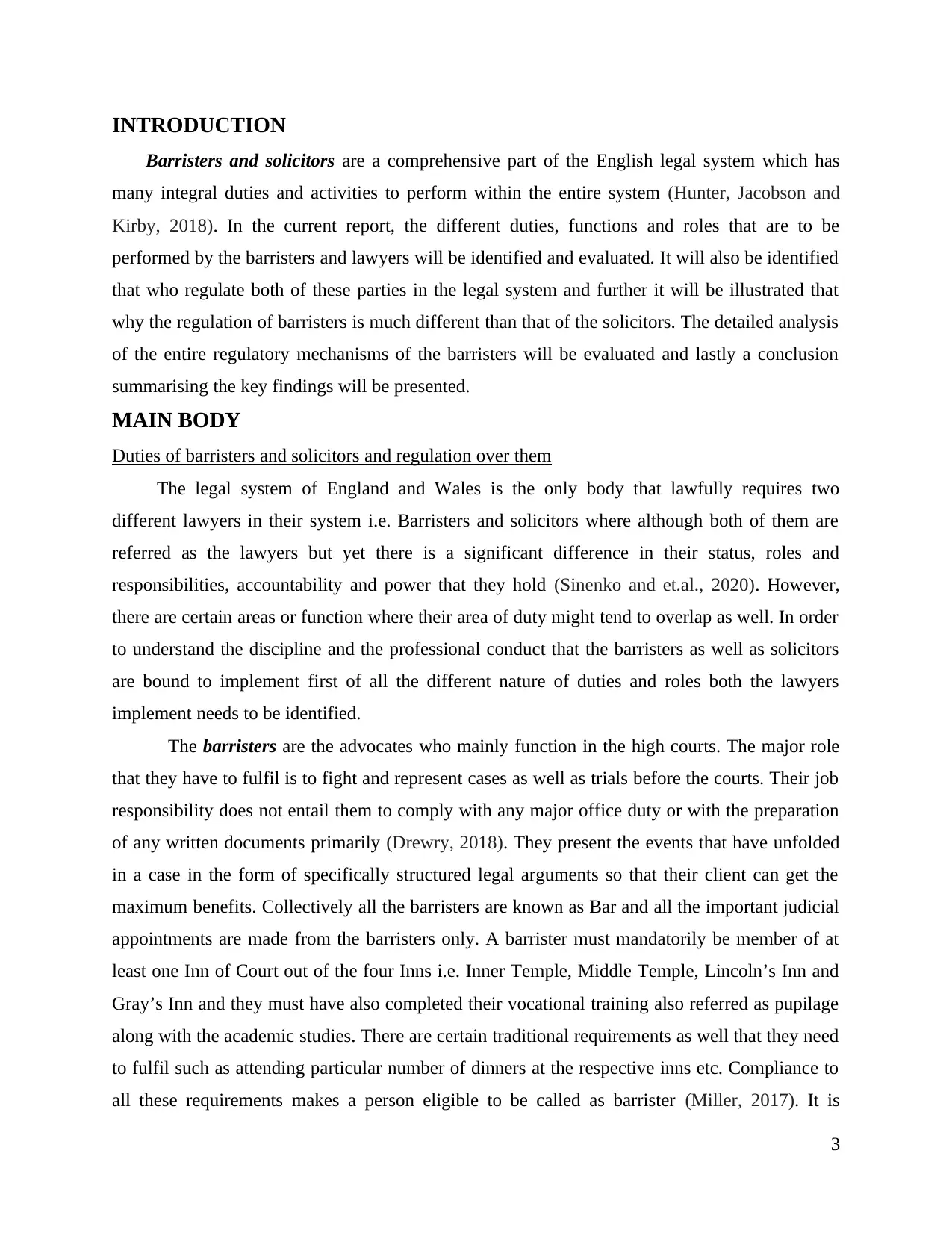
INTRODUCTION
Barristers and solicitors are a comprehensive part of the English legal system which has
many integral duties and activities to perform within the entire system (Hunter, Jacobson and
Kirby, 2018). In the current report, the different duties, functions and roles that are to be
performed by the barristers and lawyers will be identified and evaluated. It will also be identified
that who regulate both of these parties in the legal system and further it will be illustrated that
why the regulation of barristers is much different than that of the solicitors. The detailed analysis
of the entire regulatory mechanisms of the barristers will be evaluated and lastly a conclusion
summarising the key findings will be presented.
MAIN BODY
Duties of barristers and solicitors and regulation over them
The legal system of England and Wales is the only body that lawfully requires two
different lawyers in their system i.e. Barristers and solicitors where although both of them are
referred as the lawyers but yet there is a significant difference in their status, roles and
responsibilities, accountability and power that they hold (Sinenko and et.al., 2020). However,
there are certain areas or function where their area of duty might tend to overlap as well. In order
to understand the discipline and the professional conduct that the barristers as well as solicitors
are bound to implement first of all the different nature of duties and roles both the lawyers
implement needs to be identified.
The barristers are the advocates who mainly function in the high courts. The major role
that they have to fulfil is to fight and represent cases as well as trials before the courts. Their job
responsibility does not entail them to comply with any major office duty or with the preparation
of any written documents primarily (Drewry, 2018). They present the events that have unfolded
in a case in the form of specifically structured legal arguments so that their client can get the
maximum benefits. Collectively all the barristers are known as Bar and all the important judicial
appointments are made from the barristers only. A barrister must mandatorily be member of at
least one Inn of Court out of the four Inns i.e. Inner Temple, Middle Temple, Lincoln’s Inn and
Gray’s Inn and they must have also completed their vocational training also referred as pupilage
along with the academic studies. There are certain traditional requirements as well that they need
to fulfil such as attending particular number of dinners at the respective inns etc. Compliance to
all these requirements makes a person eligible to be called as barrister (Miller, 2017). It is
3
Barristers and solicitors are a comprehensive part of the English legal system which has
many integral duties and activities to perform within the entire system (Hunter, Jacobson and
Kirby, 2018). In the current report, the different duties, functions and roles that are to be
performed by the barristers and lawyers will be identified and evaluated. It will also be identified
that who regulate both of these parties in the legal system and further it will be illustrated that
why the regulation of barristers is much different than that of the solicitors. The detailed analysis
of the entire regulatory mechanisms of the barristers will be evaluated and lastly a conclusion
summarising the key findings will be presented.
MAIN BODY
Duties of barristers and solicitors and regulation over them
The legal system of England and Wales is the only body that lawfully requires two
different lawyers in their system i.e. Barristers and solicitors where although both of them are
referred as the lawyers but yet there is a significant difference in their status, roles and
responsibilities, accountability and power that they hold (Sinenko and et.al., 2020). However,
there are certain areas or function where their area of duty might tend to overlap as well. In order
to understand the discipline and the professional conduct that the barristers as well as solicitors
are bound to implement first of all the different nature of duties and roles both the lawyers
implement needs to be identified.
The barristers are the advocates who mainly function in the high courts. The major role
that they have to fulfil is to fight and represent cases as well as trials before the courts. Their job
responsibility does not entail them to comply with any major office duty or with the preparation
of any written documents primarily (Drewry, 2018). They present the events that have unfolded
in a case in the form of specifically structured legal arguments so that their client can get the
maximum benefits. Collectively all the barristers are known as Bar and all the important judicial
appointments are made from the barristers only. A barrister must mandatorily be member of at
least one Inn of Court out of the four Inns i.e. Inner Temple, Middle Temple, Lincoln’s Inn and
Gray’s Inn and they must have also completed their vocational training also referred as pupilage
along with the academic studies. There are certain traditional requirements as well that they need
to fulfil such as attending particular number of dinners at the respective inns etc. Compliance to
all these requirements makes a person eligible to be called as barrister (Miller, 2017). It is
3
⊘ This is a preview!⊘
Do you want full access?
Subscribe today to unlock all pages.

Trusted by 1+ million students worldwide
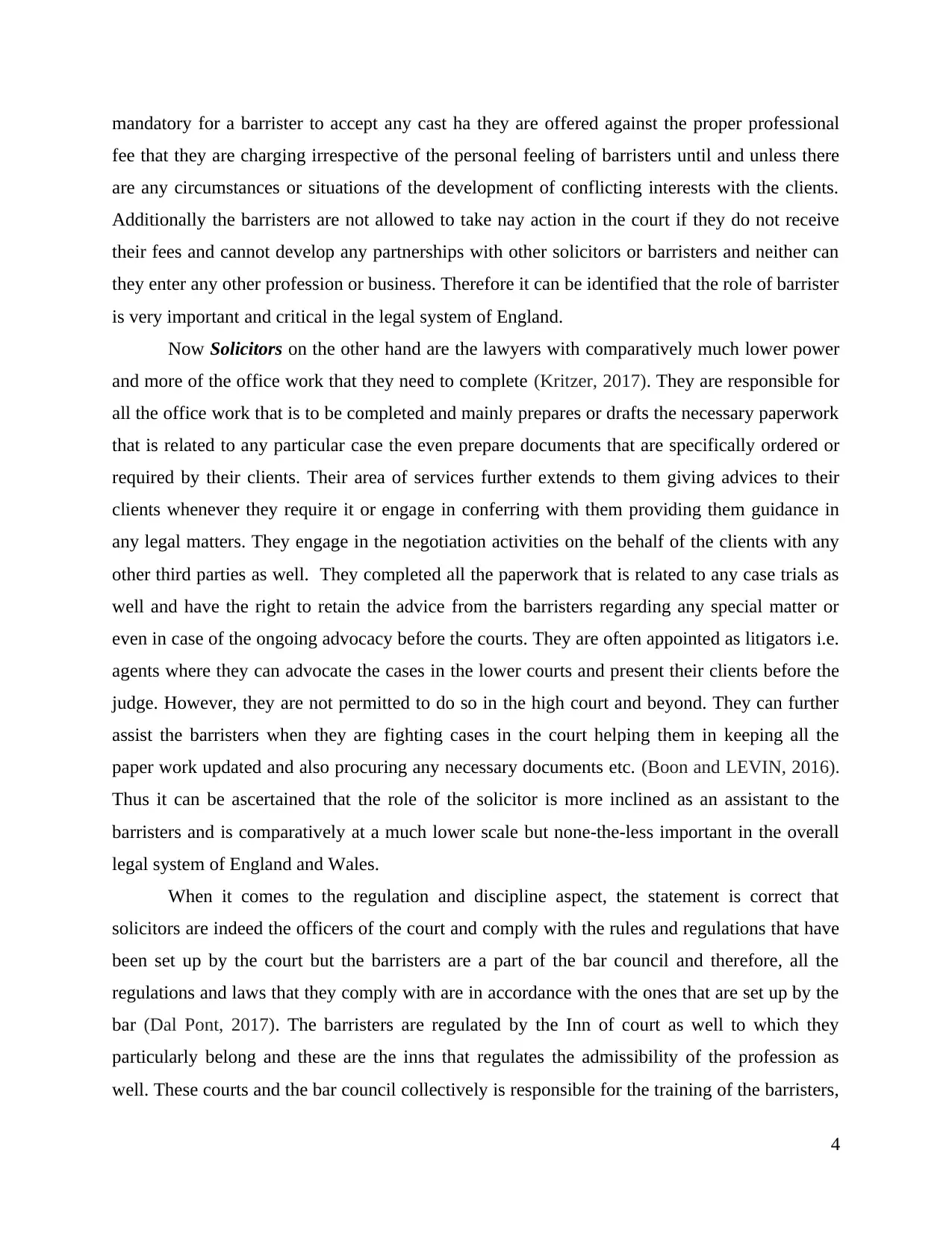
mandatory for a barrister to accept any cast ha they are offered against the proper professional
fee that they are charging irrespective of the personal feeling of barristers until and unless there
are any circumstances or situations of the development of conflicting interests with the clients.
Additionally the barristers are not allowed to take nay action in the court if they do not receive
their fees and cannot develop any partnerships with other solicitors or barristers and neither can
they enter any other profession or business. Therefore it can be identified that the role of barrister
is very important and critical in the legal system of England.
Now Solicitors on the other hand are the lawyers with comparatively much lower power
and more of the office work that they need to complete (Kritzer, 2017). They are responsible for
all the office work that is to be completed and mainly prepares or drafts the necessary paperwork
that is related to any particular case the even prepare documents that are specifically ordered or
required by their clients. Their area of services further extends to them giving advices to their
clients whenever they require it or engage in conferring with them providing them guidance in
any legal matters. They engage in the negotiation activities on the behalf of the clients with any
other third parties as well. They completed all the paperwork that is related to any case trials as
well and have the right to retain the advice from the barristers regarding any special matter or
even in case of the ongoing advocacy before the courts. They are often appointed as litigators i.e.
agents where they can advocate the cases in the lower courts and present their clients before the
judge. However, they are not permitted to do so in the high court and beyond. They can further
assist the barristers when they are fighting cases in the court helping them in keeping all the
paper work updated and also procuring any necessary documents etc. (Boon and LEVIN, 2016).
Thus it can be ascertained that the role of the solicitor is more inclined as an assistant to the
barristers and is comparatively at a much lower scale but none-the-less important in the overall
legal system of England and Wales.
When it comes to the regulation and discipline aspect, the statement is correct that
solicitors are indeed the officers of the court and comply with the rules and regulations that have
been set up by the court but the barristers are a part of the bar council and therefore, all the
regulations and laws that they comply with are in accordance with the ones that are set up by the
bar (Dal Pont, 2017). The barristers are regulated by the Inn of court as well to which they
particularly belong and these are the inns that regulates the admissibility of the profession as
well. These courts and the bar council collectively is responsible for the training of the barristers,
4
fee that they are charging irrespective of the personal feeling of barristers until and unless there
are any circumstances or situations of the development of conflicting interests with the clients.
Additionally the barristers are not allowed to take nay action in the court if they do not receive
their fees and cannot develop any partnerships with other solicitors or barristers and neither can
they enter any other profession or business. Therefore it can be identified that the role of barrister
is very important and critical in the legal system of England.
Now Solicitors on the other hand are the lawyers with comparatively much lower power
and more of the office work that they need to complete (Kritzer, 2017). They are responsible for
all the office work that is to be completed and mainly prepares or drafts the necessary paperwork
that is related to any particular case the even prepare documents that are specifically ordered or
required by their clients. Their area of services further extends to them giving advices to their
clients whenever they require it or engage in conferring with them providing them guidance in
any legal matters. They engage in the negotiation activities on the behalf of the clients with any
other third parties as well. They completed all the paperwork that is related to any case trials as
well and have the right to retain the advice from the barristers regarding any special matter or
even in case of the ongoing advocacy before the courts. They are often appointed as litigators i.e.
agents where they can advocate the cases in the lower courts and present their clients before the
judge. However, they are not permitted to do so in the high court and beyond. They can further
assist the barristers when they are fighting cases in the court helping them in keeping all the
paper work updated and also procuring any necessary documents etc. (Boon and LEVIN, 2016).
Thus it can be ascertained that the role of the solicitor is more inclined as an assistant to the
barristers and is comparatively at a much lower scale but none-the-less important in the overall
legal system of England and Wales.
When it comes to the regulation and discipline aspect, the statement is correct that
solicitors are indeed the officers of the court and comply with the rules and regulations that have
been set up by the court but the barristers are a part of the bar council and therefore, all the
regulations and laws that they comply with are in accordance with the ones that are set up by the
bar (Dal Pont, 2017). The barristers are regulated by the Inn of court as well to which they
particularly belong and these are the inns that regulates the admissibility of the profession as
well. These courts and the bar council collectively is responsible for the training of the barristers,
4
Paraphrase This Document
Need a fresh take? Get an instant paraphrase of this document with our AI Paraphraser
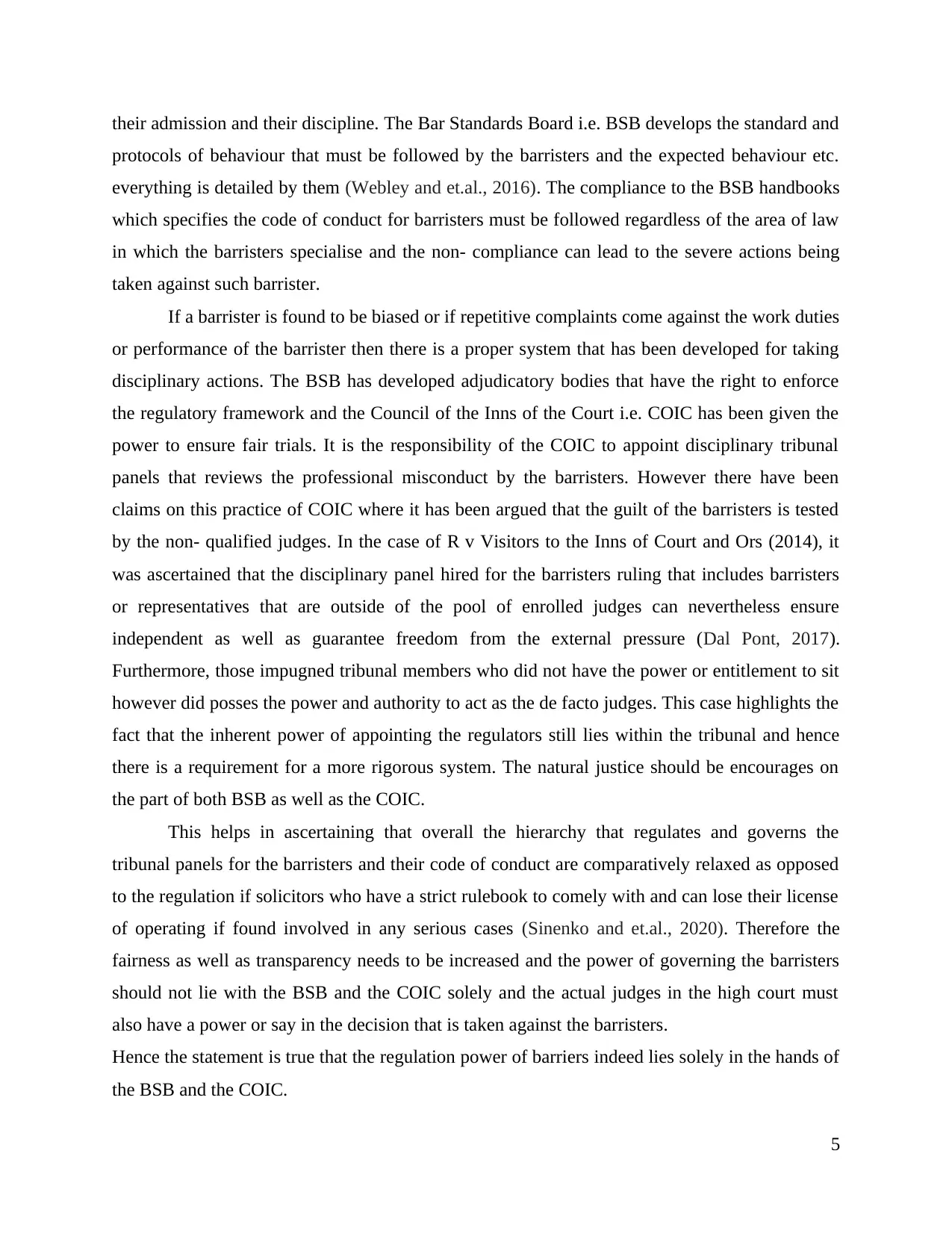
their admission and their discipline. The Bar Standards Board i.e. BSB develops the standard and
protocols of behaviour that must be followed by the barristers and the expected behaviour etc.
everything is detailed by them (Webley and et.al., 2016). The compliance to the BSB handbooks
which specifies the code of conduct for barristers must be followed regardless of the area of law
in which the barristers specialise and the non- compliance can lead to the severe actions being
taken against such barrister.
If a barrister is found to be biased or if repetitive complaints come against the work duties
or performance of the barrister then there is a proper system that has been developed for taking
disciplinary actions. The BSB has developed adjudicatory bodies that have the right to enforce
the regulatory framework and the Council of the Inns of the Court i.e. COIC has been given the
power to ensure fair trials. It is the responsibility of the COIC to appoint disciplinary tribunal
panels that reviews the professional misconduct by the barristers. However there have been
claims on this practice of COIC where it has been argued that the guilt of the barristers is tested
by the non- qualified judges. In the case of R v Visitors to the Inns of Court and Ors (2014), it
was ascertained that the disciplinary panel hired for the barristers ruling that includes barristers
or representatives that are outside of the pool of enrolled judges can nevertheless ensure
independent as well as guarantee freedom from the external pressure (Dal Pont, 2017).
Furthermore, those impugned tribunal members who did not have the power or entitlement to sit
however did posses the power and authority to act as the de facto judges. This case highlights the
fact that the inherent power of appointing the regulators still lies within the tribunal and hence
there is a requirement for a more rigorous system. The natural justice should be encourages on
the part of both BSB as well as the COIC.
This helps in ascertaining that overall the hierarchy that regulates and governs the
tribunal panels for the barristers and their code of conduct are comparatively relaxed as opposed
to the regulation if solicitors who have a strict rulebook to comely with and can lose their license
of operating if found involved in any serious cases (Sinenko and et.al., 2020). Therefore the
fairness as well as transparency needs to be increased and the power of governing the barristers
should not lie with the BSB and the COIC solely and the actual judges in the high court must
also have a power or say in the decision that is taken against the barristers.
Hence the statement is true that the regulation power of barriers indeed lies solely in the hands of
the BSB and the COIC.
5
protocols of behaviour that must be followed by the barristers and the expected behaviour etc.
everything is detailed by them (Webley and et.al., 2016). The compliance to the BSB handbooks
which specifies the code of conduct for barristers must be followed regardless of the area of law
in which the barristers specialise and the non- compliance can lead to the severe actions being
taken against such barrister.
If a barrister is found to be biased or if repetitive complaints come against the work duties
or performance of the barrister then there is a proper system that has been developed for taking
disciplinary actions. The BSB has developed adjudicatory bodies that have the right to enforce
the regulatory framework and the Council of the Inns of the Court i.e. COIC has been given the
power to ensure fair trials. It is the responsibility of the COIC to appoint disciplinary tribunal
panels that reviews the professional misconduct by the barristers. However there have been
claims on this practice of COIC where it has been argued that the guilt of the barristers is tested
by the non- qualified judges. In the case of R v Visitors to the Inns of Court and Ors (2014), it
was ascertained that the disciplinary panel hired for the barristers ruling that includes barristers
or representatives that are outside of the pool of enrolled judges can nevertheless ensure
independent as well as guarantee freedom from the external pressure (Dal Pont, 2017).
Furthermore, those impugned tribunal members who did not have the power or entitlement to sit
however did posses the power and authority to act as the de facto judges. This case highlights the
fact that the inherent power of appointing the regulators still lies within the tribunal and hence
there is a requirement for a more rigorous system. The natural justice should be encourages on
the part of both BSB as well as the COIC.
This helps in ascertaining that overall the hierarchy that regulates and governs the
tribunal panels for the barristers and their code of conduct are comparatively relaxed as opposed
to the regulation if solicitors who have a strict rulebook to comely with and can lose their license
of operating if found involved in any serious cases (Sinenko and et.al., 2020). Therefore the
fairness as well as transparency needs to be increased and the power of governing the barristers
should not lie with the BSB and the COIC solely and the actual judges in the high court must
also have a power or say in the decision that is taken against the barristers.
Hence the statement is true that the regulation power of barriers indeed lies solely in the hands of
the BSB and the COIC.
5
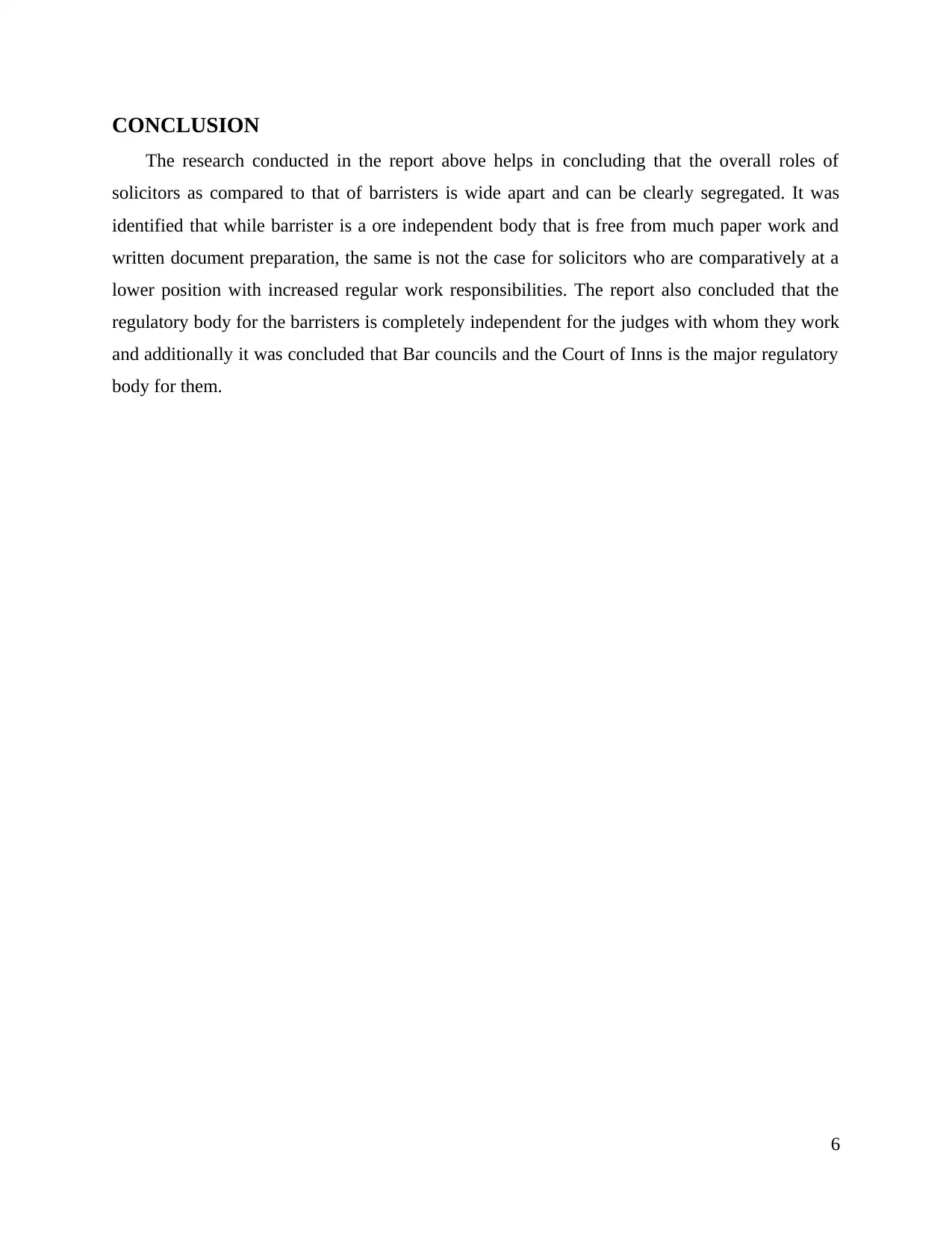
CONCLUSION
The research conducted in the report above helps in concluding that the overall roles of
solicitors as compared to that of barristers is wide apart and can be clearly segregated. It was
identified that while barrister is a ore independent body that is free from much paper work and
written document preparation, the same is not the case for solicitors who are comparatively at a
lower position with increased regular work responsibilities. The report also concluded that the
regulatory body for the barristers is completely independent for the judges with whom they work
and additionally it was concluded that Bar councils and the Court of Inns is the major regulatory
body for them.
6
The research conducted in the report above helps in concluding that the overall roles of
solicitors as compared to that of barristers is wide apart and can be clearly segregated. It was
identified that while barrister is a ore independent body that is free from much paper work and
written document preparation, the same is not the case for solicitors who are comparatively at a
lower position with increased regular work responsibilities. The report also concluded that the
regulatory body for the barristers is completely independent for the judges with whom they work
and additionally it was concluded that Bar councils and the Court of Inns is the major regulatory
body for them.
6
⊘ This is a preview!⊘
Do you want full access?
Subscribe today to unlock all pages.

Trusted by 1+ million students worldwide
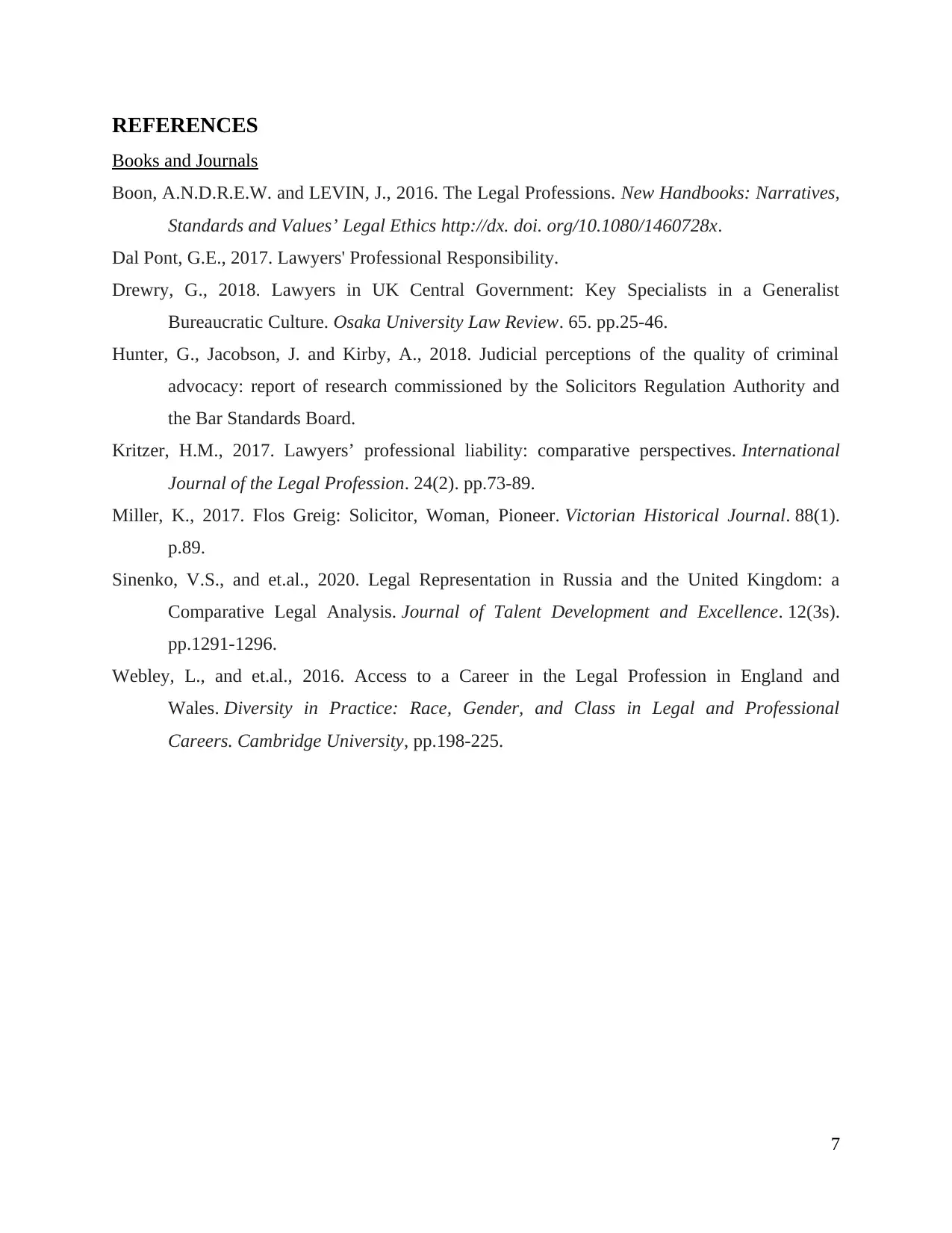
REFERENCES
Books and Journals
Boon, A.N.D.R.E.W. and LEVIN, J., 2016. The Legal Professions. New Handbooks: Narratives,
Standards and Values’ Legal Ethics http://dx. doi. org/10.1080/1460728x.
Dal Pont, G.E., 2017. Lawyers' Professional Responsibility.
Drewry, G., 2018. Lawyers in UK Central Government: Key Specialists in a Generalist
Bureaucratic Culture. Osaka University Law Review. 65. pp.25-46.
Hunter, G., Jacobson, J. and Kirby, A., 2018. Judicial perceptions of the quality of criminal
advocacy: report of research commissioned by the Solicitors Regulation Authority and
the Bar Standards Board.
Kritzer, H.M., 2017. Lawyers’ professional liability: comparative perspectives. International
Journal of the Legal Profession. 24(2). pp.73-89.
Miller, K., 2017. Flos Greig: Solicitor, Woman, Pioneer. Victorian Historical Journal. 88(1).
p.89.
Sinenko, V.S., and et.al., 2020. Legal Representation in Russia and the United Kingdom: a
Comparative Legal Analysis. Journal of Talent Development and Excellence. 12(3s).
pp.1291-1296.
Webley, L., and et.al., 2016. Access to a Career in the Legal Profession in England and
Wales. Diversity in Practice: Race, Gender, and Class in Legal and Professional
Careers. Cambridge University, pp.198-225.
7
Books and Journals
Boon, A.N.D.R.E.W. and LEVIN, J., 2016. The Legal Professions. New Handbooks: Narratives,
Standards and Values’ Legal Ethics http://dx. doi. org/10.1080/1460728x.
Dal Pont, G.E., 2017. Lawyers' Professional Responsibility.
Drewry, G., 2018. Lawyers in UK Central Government: Key Specialists in a Generalist
Bureaucratic Culture. Osaka University Law Review. 65. pp.25-46.
Hunter, G., Jacobson, J. and Kirby, A., 2018. Judicial perceptions of the quality of criminal
advocacy: report of research commissioned by the Solicitors Regulation Authority and
the Bar Standards Board.
Kritzer, H.M., 2017. Lawyers’ professional liability: comparative perspectives. International
Journal of the Legal Profession. 24(2). pp.73-89.
Miller, K., 2017. Flos Greig: Solicitor, Woman, Pioneer. Victorian Historical Journal. 88(1).
p.89.
Sinenko, V.S., and et.al., 2020. Legal Representation in Russia and the United Kingdom: a
Comparative Legal Analysis. Journal of Talent Development and Excellence. 12(3s).
pp.1291-1296.
Webley, L., and et.al., 2016. Access to a Career in the Legal Profession in England and
Wales. Diversity in Practice: Race, Gender, and Class in Legal and Professional
Careers. Cambridge University, pp.198-225.
7
Paraphrase This Document
Need a fresh take? Get an instant paraphrase of this document with our AI Paraphraser

8
1 out of 8
Related Documents
Your All-in-One AI-Powered Toolkit for Academic Success.
+13062052269
info@desklib.com
Available 24*7 on WhatsApp / Email
![[object Object]](/_next/static/media/star-bottom.7253800d.svg)
Unlock your academic potential
Copyright © 2020–2025 A2Z Services. All Rights Reserved. Developed and managed by ZUCOL.




